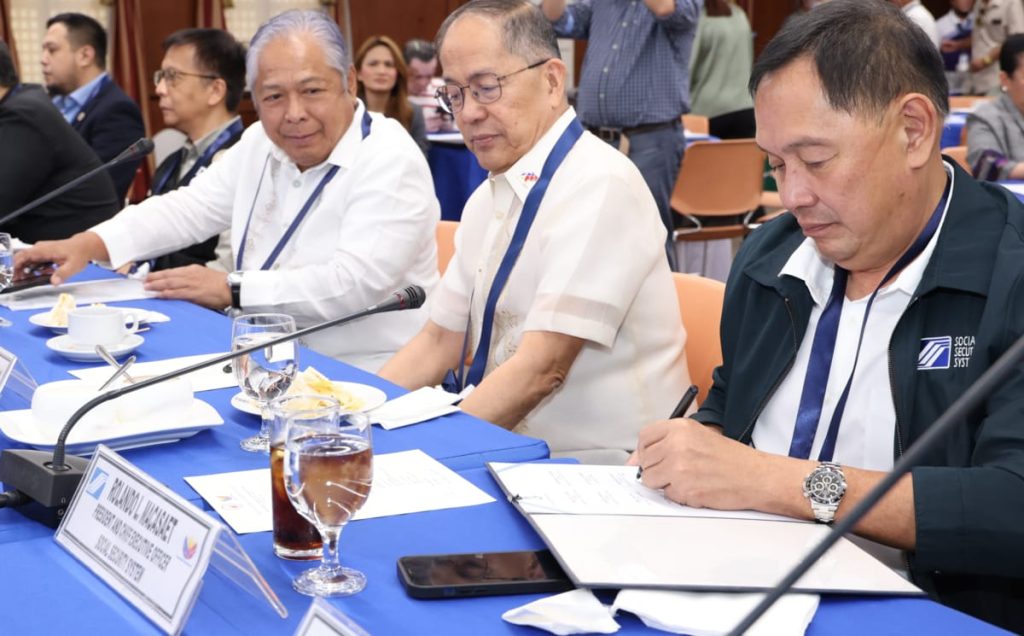
The Social Security System (SSS) on Friday assured the social security coverage of all Filipino seafarers and maritime professionals as labor groups, manning agencies, ship owners, and government agencies formed the Maritime Industry Tripartite Council (MITC) during a pact signing ceremony in Intramuros, Manila.
SSS President and Chief Executive Officer Rolando Ledesma Macasaet emphasized the collective effort as SSS joined as one of the members of the newly created Maritime Industry Tripartite Council, representing the government sector.
Macasaet lauded the Department of Migrant Workers (DMW) led by its newly appointed Secretary, Hans Leo J. Cacdac, for spearheading the creation of the Council.
Macasaet stressed that the Council was a testament to the unified commitment to address maritime employment concerns and advance the protection of Filipino seafarers.
“With this agreement, SSS commits itself to promoting the welfare of Filipino seafarers and their families by providing them with financial assistance during contingencies such as disability, sickness, maternity, unemployment, old age, funeral and death,” Macasaet said.
Macasaet urged all Filipino seafarers to become SSS members, underlining the significant benefits of having social security protection for themselves and their families, which is a crucial step towards ensuring a secure future.
Records showed that around 350,000 seafarers are members of SSS.
SSS benefits for seafarers
Macasaet told seafarers to strive to pay at least 120 monthly SSS contributions so they can receive a lifetime monthly pension once they have retired.
“Contributing to the SSS is one way of investing in their future. Aside from retirement benefits, employed SSS members like seafarers are entitled to sickness, maternity, disability, unemployment, funeral, and death benefits,” he said.
Macasaet added that they can also take advantage of various SSS loan programs, such as salary and calamity, and get additional coverage from the Employees’ Compensation (EC) Program for work-related sickness or injury resulting to disability, or death.
“Since seafarers are contributing to the regular SSS program with a Monthly Salary Credit (MSC) that exceeds P20,000, they are automatically enrolled in the Workers’ Investment and Savings Program (WISP),” he said.
Under this compulsory provident fund scheme, he said each contributing member will have an account wherein SSS will place their contributions and investment earnings. Members pay their WISP contributions together with their regular SSS contributions.
He added that seafarers would get their total contributions and investment income at the time of their retirement, which they may opt to receive as a monthly annuity if their WISP savings exceed P100,000.
“Seafarers can receive it as a lump sum if their contributions and investment income are less than P100,000. If it is P100,000 or more, they can receive it as combination of lump sum and monthly pension or a fixed monthly annuity which will be released together with their regular monthly pension,” he said.
Likewise, Macasaet urged seafarers to consider their financial future and save their hard-earned money in WISP Plus, the SSS voluntary retirement savings program. He highlighted this as an additional benefit, giving seafarers the power to choose and plan for their retirement, in addition to the retirement pension from the regular social security program and annuity from the WISP.
Macasaet explained that members can contribute as little as P500 per payment whenever they want to receive this additional layer of social security protection.
He noted the members’ pooled contributions under WISP Plus would generate investment earnings, which would be credited to their individual accounts tax-free.
Members of the Council
The DMW will serve as the Maritime Industry Tripartite Council Chairperson, leading the efforts to ensure the welfare and protection of seafarers. Members from the government sector include SSS, Department of Labor and Employment (DOLE), Department of Foreign Affairs (DFA), Department of Health (DOH), Department of Transportation (DOTr), Department of Information and Communications Technology (DICT), Commission on Higher Education, Philippine Health Insurance Corporation (PhilHealth), Home Development Mutual Fund (Pag-IBIG Fund), and National Telecommunications Commission (NTC).
Members representing the labor sector include the Trade Union Congress of the Philippines (TUCP), the Associated Marine Officers’ and Seamen’s Union of the Philippines (AMOSUP), the International Seamen’s Mutual Labor Association, the Mariners and Allied Transport Employees Union, Associated Philippine Seafarers Unions, Porty Workers Union of the Philippines, Federation of Free Workers, and United Filipino Seafarers.
Meanwhile, the management sector is represented by the Conference of Maritime Manning Agencies, Filipino Shipowners Association, Filipino Association for Mariners Employment, Inc., International Maritime Association of the Philippines, International Maritime Employers’ Council Ltd., Philippine Chamber of Arrastre and Stevedoring Operators, Inc., Philippine Interisland Shipping Association, Philippine-Japan Manning Consultative Council, Inc., ALMA Maritime Group, and Ship Manager Association of the Philippines.
